Results
-
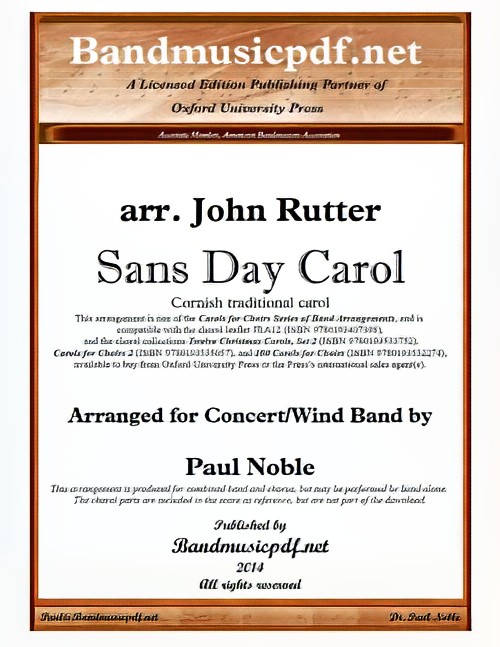 £75.00
£75.00Sans Day Carol (Concert Band with Optional Choir - Score and Parts) - Noble & Rutter
The title of this folk carol is a corruption of St Day, the Cornish village (named after a Breton saint) where it was heard and written down in the early twentieth century. The choral part is shown in the score, but is not included in the set. This arrangement is compatible with the choral work which appears in the collections 'Twelve Christmas Carols, Set 2', 'Carols for Choirs 2' and '100 Carols for Choirs'.
Estimated dispatch 7-14 working days
-
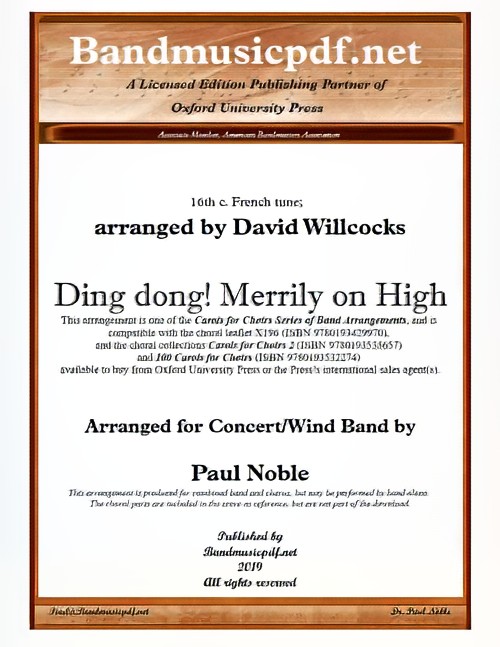 £75.00
£75.00Ding Dong! Merrily on High (Concert Band with Optional Choir - Score and Parts) - Noble & Willcocks
Ring in the holidays with this famous Christmas carol, Ding Dong! Merrily on High. The tune first appeared as a French dance in the 1500's. The lyrics were written by George Ratcliffe Woodward and published in 1924 in The Cambridge Carol-Book. More recently, Sir David Willcocks made an arrangement for the second book of Carols for Choirs, on which this arrangement for Concert/Wind Band is based. His original arrangement was in the key of B major, which has been modified to B-flat major to better accommodate the instruments of the band. This represents one of the Series of Band Arrangements compatible with David Willcocks' Carols for Choirs.
Estimated dispatch 7-14 working days
-
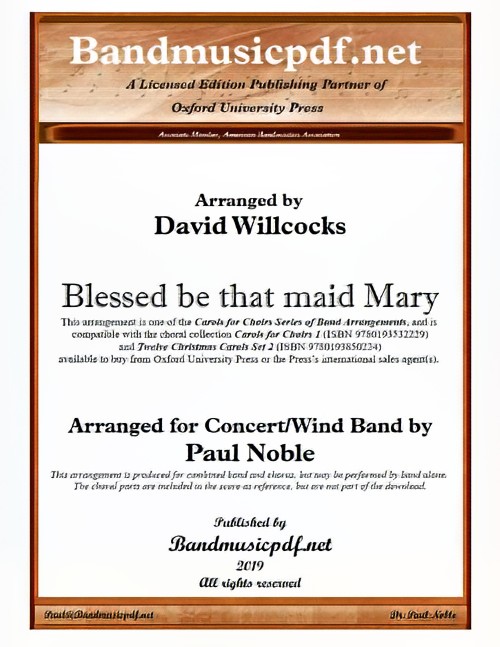 £75.00
£75.00Blessed Be That Maid Mary (Concert Band with Optional Choir - Score and Parts) - Noble & Willcocks
The text for Blessed be that maid Mary comes from an anonymous 15th century English author. It makes liberal use of a common literacy device of the time: mixing English and Latin phrases together. The melody is from William Ballet's Lute Book (c.1590), David Willcocks's setting was written for the choir of King's College, Cambridge, and was first published in Carols for Choirs in 1961. This arrangement represents one in the Series of Band Arrangements compatible with David Willcocks' Carols for Choirs.
Estimated dispatch 7-14 working days
-
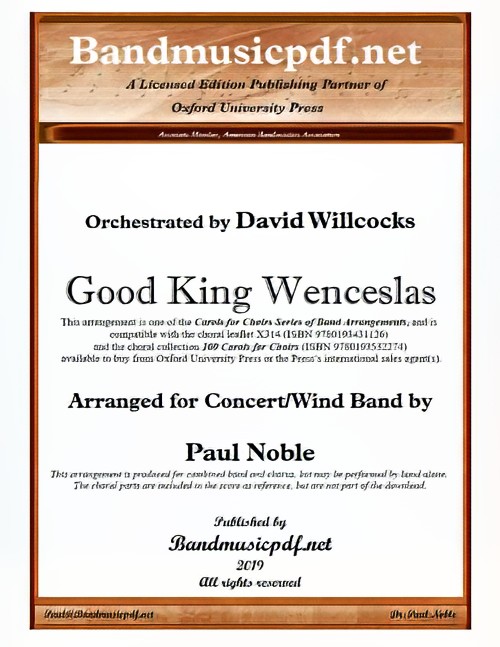 £75.00
£75.00Good King Wenceslas (Concert Band with Optional Choir - Score and Parts) - Noble & Willcocks
Good King Wenceslas is a Christmas carol that tells a story of a Bohemian king going on a journey and braving harsh winter weather to give alms to a poor peasant on the Feast of Stephen (December 26, the Second Day of Christmas). During the journey, his page is about to give up the struggle against the cold weather, but is enabled to continue by following the king's footprints, step for step, through the deep snow. The legend is based on the life of the historical Saint Wenceslaus I, Duke of Bohemia or Svat Vclav in Czech (907-935). The name Wenceslas is a Latinised version of the old Czech language Venceslav. In 1853, English hymnwriter John Mason Neale wrote the Wenceslas lyrics, in collaboration with his music editor Thomas Helmore, and the carol first appeared in Carols for Christmas-Tide, 1853. Neale's lyrics were set to the melody of a 13th-century spring carol Tempus adest floridum (The time is near for flowering) first published in the 1582 Finnish song collection Piae Cantiones. This arrangement represents one in the Series of Band Arrangements compatible with David Willcocks' Carols for Choirs.
Estimated dispatch 7-14 working days
-
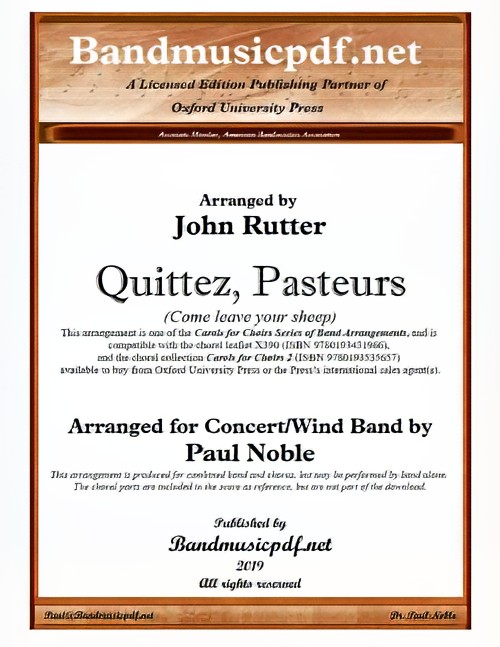 £75.00
£75.00Quittez, Pasteurs (Come, Leave Your Sheep) (Concert Band with Optional Choir - Score and Parts) - Noble & Rutter
With lyrics created in the seventeenth or early eighteenth century and music from around 1875, Quittez, pasteurs is a traditional French folksong perhaps originating in the Anjou region. The original arrangement by John Rutter is transcribed for Concert/Wind Band, and is compatible with the published choral versions in Carols for Choirs 2. This arrangement represents one in the Series of Band Arrangements compatible with David Willcocks' Carols for Choirs.
Estimated dispatch 7-14 working days
-
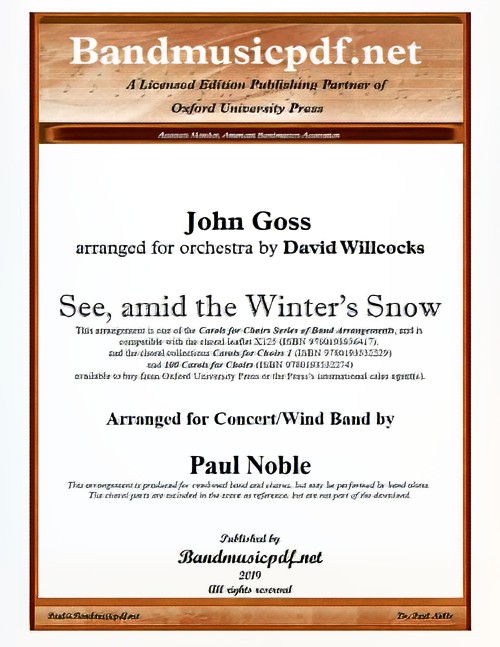 £75.00
£75.00See, Amid the Winter's Snow (Concert Band with Optional Choir - Score and Parts) - Goss, John - Noble & Willcocks
See, amid the Winter's Snow, also known as Hymn for Christmas Day and The Hymn for Christmas, is an English Christmas carol. It was written by Edward Caswall (1814-1878), with music composed by Sir John Goss (1800-1880). This stunning setting by David Willcocks is included in his Carols for Choirs 1 (#33), on which this arrangement is based. This represents one of the Series of Band Arrangements compatible with David Willcocks' Carols for Choirs.
Estimated dispatch 7-14 working days
-
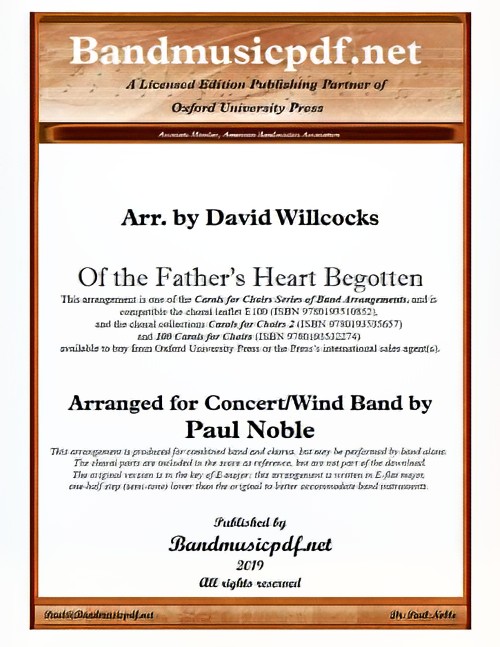 £75.00
£75.00Of the Father's Heart Begotten (Concert Band with Optional Choir - Score and Parts) - Noble & Willcocks
Of the Father's Heart Begotten alternatively known as Of the Father's Love Begotten is a doctrinal hymn based on the Latin poem 'Corde natus' by the Roman poet Aurelius Prudentius. The ancient poem was translated and paired with a medieval plainchant melody Divinum mysterium. Divinum mysterium was a Sanctus trope - an ancient plainchant melody which over the years had been musically embellished. An early version of this chant appears in manuscript form as early as the 10th century, although without the melodic additions, and trope versions with various melodic differences appear in Italian, German, Gallacian, Bohemian and Spanish manuscripts dating from the 13th to 16th centuries. Dissatisfied with an earlier translation, Roby Furley Davis (1866-1937), a scholar at St. John's College, Cambridge, wrote a new version for the English Hymnal of 1906. This version was also used in the popular Carols for Choirs series by David Willcocks. This arrangement represents one in the Series of Band Arrangements compatible with David Willcocks' Carols for Choirs.
Estimated dispatch 7-14 working days
-
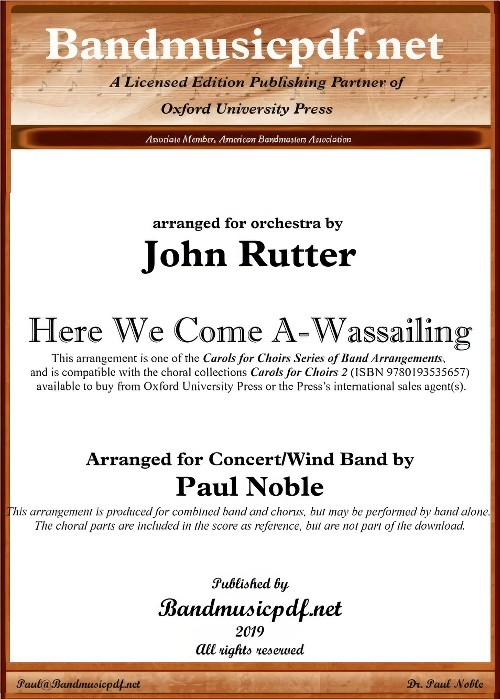 £75.00
£75.00Here We Come A-Wassailing (Concert Band with Optional Choir - Score and Parts) - Noble & Rutter
Here We Come A-wassailing (or Here We Come A-caroling) is an English traditional Christmas carol and New Year song, apparently composed c. 1850. The old English wassail song refers to 'wassailing', or singing carols door to door wishing good health, while the a- is an archaic intensifying prefix; compare A-Hunting We Will Go and lyrics to The Twelve Days of Christmas (e.g., Six geese a-laying). According to Readers Digest; the Christmas spirit often made the rich a little more generous than usual, and bands of beggars and orphans used to dance their way through the snowy streets of England, offering to sing good cheer and to tell good fortune if the householder would give them a drink from his wassail bowl or a penny or a pork pie or, let them stand for a few minutes beside the warmth of his hearth. This arrangement represents one in the Series of Band Arrangements compatible with David Willcocks' Carols for Choirs.
Estimated dispatch 7-14 working days
-
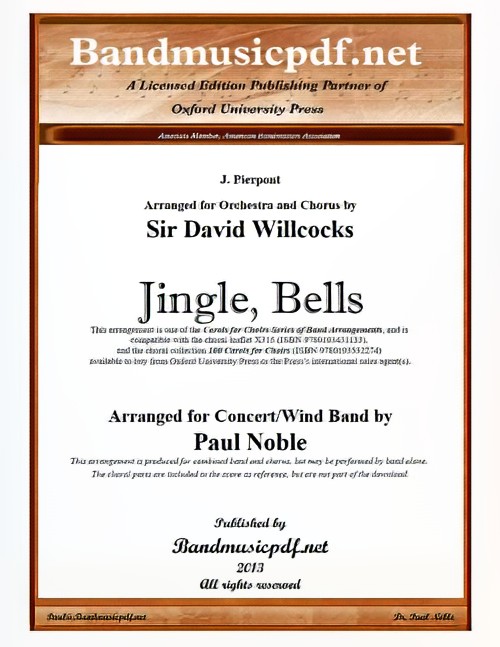 £75.00
£75.00Jingle, Bells (Concert Band - Score and Parts) - Pierpont, James Lord - Noble & Willcocks
This arrangement is one of the Carols for Choirs Series of Band Arrangements, and is compatible with the choral octavo, and the choral collection 100 Carols for Choirs available seperately.
Estimated dispatch 7-14 working days
-
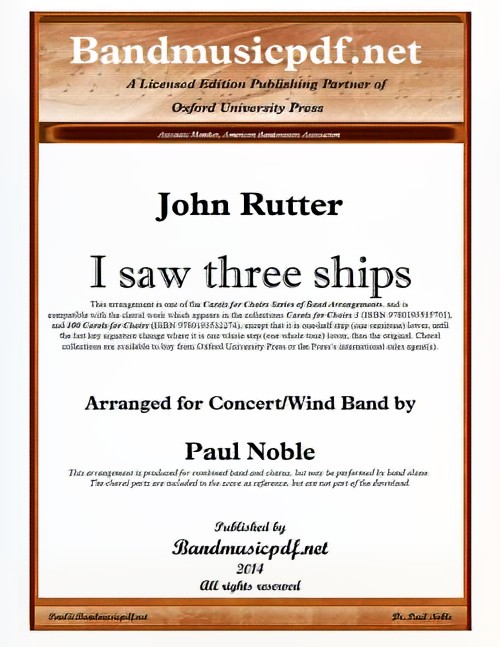 £75.00
£75.00I Saw Three Ships (Concert Band with Optional Choir - Score and Parts) - Rutter, John - Noble, Paul
John Rutter made this setting of an English folksong for The Bach Choir in 1977. The choral part is shown in the score, but is not included as a part of the set. This arrangement is compatible with the choral work which appears in the collections Carols for Choirs 3 and 100 Carols for Choirs, except that it is one-half step (one semitone) lower, until the last key signature change where it is one whole step (one whole tone) lower, than the original.
Estimated dispatch 7-14 working days
